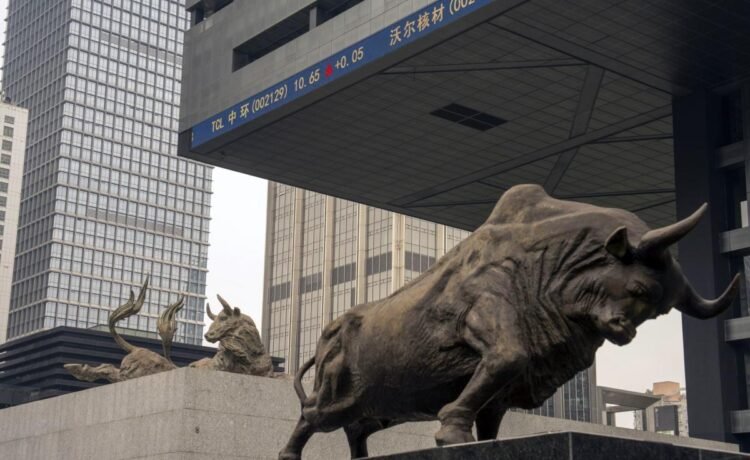(Bloomberg) — Equity futures in Europe and the US pointed to a modestly higher open following a slump in Asia, where economic and geopolitical risks overwhelmed optimism surrounding interest-rate cuts.
Most Read from Bloomberg
Contracts for Euro Stoxx 50 climbed 0.1% while US futures also advanced after the S&P 500 fell for a second session on Thursday. The MSCI Asia Pacific Index declined more than 1%, set for its biggest weekly drop in three months. Chinese stocks in Hong Kong slumped as the Third Plenum failed to convince investors about the economy’s new growth impetus.
Asian currencies slipped against the greenback amid the equities selloff, with the Taiwanese dollar reaching its weakest level in more than eight years. A rout in chip stocks continued in Asia on concern the US would impose fresh restrictions on sales to China. Shares of Taiwan Semiconductor Manufacturing Co. fell for a third day.
“We had two decent sized back-to-back losses in the US, something not seen since perhaps mid-April, which seemed to indicate the rally in US stocks had finally stalled, prompting profit taking in Asia,” said Wong Kok Hoong, head of equity sales trading at Maybank Securities Pte. “Up ahead in the next two weeks, all eyes will be on FOMC meeting and earnings in the US for large tech.”
Treasury yields were little changed after 10-year yields rose four basis points to 4.20% Thursday. The yen declined for second straight session as Japan inflation data for June came in softer than estimated. An index of the dollar held on to gains from the prior session.
US initial jobless claims data on Thursday showed the biggest increase since early May in a sign of cooling in the labor market that supports expectations the Federal Reserve will soon cut interest rates. The central bank is getting closer to reducing borrowing costs in September amid growing confidence that price stability is within sight.
Investors were also gauging signs that President Joe Biden’s grasp on the Democratic presidential nomination appeared to be slipping as he weighed increasingly public warnings from his party’s top lawmakers.
Back in Asia, investors were disappointed as the Third Plenum offered few initial signs that the top leadership is preparing major steps to boost demand or arrest the property slump. President Xi Jinping vowed to make “high-quality development” the guiding force of the world’s No. 2 economy.
Today’s negative price action in Asian equities has more to do with concerns over new semiconductor sector restrictions from the US and a relatively disappointing communique from China’s Third Plenum, than the “twists and turns of the US presidential race,” said Homin Lee, senior macro strategist at Lombard Odier Singapore Ltd.
In other releases, Malaysia’s economy expanded at the fastest pace in six quarters.
In corporate news, Samsung Electronics Co. has agreed to resume negotiations with the union organizing strikes across its chipmaking plants. Meanwhile, Citigroup Inc. expects foreign investors to deploy as much as $100 billion in India this fiscal year, drawn to high-tech manufacturing, infrastructure and climate-change projects.
In commodities, oil edged lower on concerns that Chinese growth may slow and jeopardize consumption. Gold also fell.
Key events this week:
Some of the main moves in markets:
Stocks
-
S&P 500 futures rose 0.2% as of 6:52 a.m. London time
-
Nikkei 225 futures (OSE) fell 0.4%
-
Japan’s Topix fell 0.3%
-
Australia’s S&P/ASX 200 fell 0.9%
-
Hong Kong’s Hang Seng fell 2%
-
The Shanghai Composite fell 0.1%
-
Euro Stoxx 50 futures rose 0.1%
-
Nasdaq 100 futures rose 0.3%
Currencies
-
The Bloomberg Dollar Spot Index was little changed
-
The euro was little changed at $1.0888
-
The Japanese yen fell 0.3% to 157.83 per dollar
-
The offshore yuan fell 0.2% to 7.2836 per dollar
-
The Australian dollar fell 0.1% to $0.6699
-
The British pound was little changed at $1.2936
Cryptocurrencies
-
Bitcoin rose 0.6% to $64,216.56
-
Ether rose 0.3% to $3,423.57
Bonds
-
The yield on 10-year Treasuries advanced one basis point to 4.21%
-
Japan’s 10-year yield was little changed at 1.030%
-
Australia’s 10-year yield advanced six basis points to 4.30%
Commodities
-
West Texas Intermediate crude fell 0.7% to $82.21 a barrel
-
Spot gold fell 0.9% to $2,422.19 an ounce
This story was produced with the assistance of Bloomberg Automation.
–With assistance from Zhu Lin, John Cheng and Winnie Hsu.
Most Read from Bloomberg Businessweek
©2024 Bloomberg L.P.















